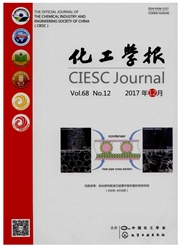

 中文摘要:
中文摘要:
气相声速是测量准确度最高的热物性之一,并可以导出理想气体比定压热容和第二维里系数等其他热力学性质。分析了定程干涉法中存在的系统偏差,建立了绝对系统偏差(δFAE)和相对系统偏差(δFFE)对导出热力性质影响的数学模型,并开展了模拟计算。研究结果表明,理想气体比热容比受绝对系统偏差的影响为2δFAE,但是绝对系统偏差对多原子气体的理想气体比定压热容的影响大,可高于-100δFAE,且温度越高,影响越大;相对系统偏差主要影响声速维里系数,在温度和相对系统偏差相同时,不同工质的第二声速维里系数的绝对变化量相同。绝对系统偏差和相对系统偏差在导出第二维里系数中的影响较小。
 英文摘要:
英文摘要:
Gaseous speed of sound is an important thermophysical property measured with high precision. The ideal gas heat capacity and the second virial coefficient can be derived from the speed of sound. The systematic errors in measurements of sound speed using fixed path interferometers are analyzed. Mathematic modes are proposed for the influences of fixed absolute error (δFAE) and fixed fractional error (δFFE) on thermodynamic properties derived from gaseous speed of sound. The influences from the errors in measurements are also simulated. The results show that the heat capacity ratio of ideal gas varies with 2δFAE by the effect of the fixed absolute error, but the influence on isobaric heat capacity of ideas gas may be higher than --100δFAE and increases with temperature for polyatomic gas. The second acoustic virial coefficient is affected by the fixed fractional error. Substances have the same absolute deviations in the second acoustic virial coefficients at the same temperature and fixed fractional error. The influences of fixed absolute error and fixed fractional error on the second virial coefficients are lower.
 同期刊论文项目
同期刊论文项目
 同项目期刊论文
同项目期刊论文
 期刊信息
期刊信息
